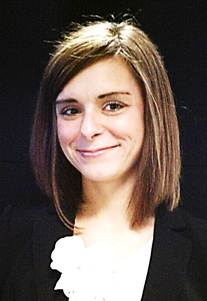
Name Lisa Schneider
- Education MS, Information Systems, Stevens Institute of Technology; B.S. Business Administration, Focus on Finance and Marketing, Ramapo College, NJ
- Target Audience High School

Cyber-attacks...as technology becomes increasingly more sophisticated the risk of being hacked by fraudsters soars. Lisa Schneider, a seasoned risk manager has been an important line of defense in stopping the silent but destructive attacks to her company's network systems. Read more to find out what makes Lisa's experience with protecting corporations from cyber-attacks so cool!
I am Vice President of Risk Management. A risk manager's job is to assess the risks facing their business and the strength of controls in place to prevent those risks. I personally focus on technology and operational risks. Some specific responsibilities include examining the technology that supports large banking transactions to ensure the firewalls and other controls in place can protect the company and detect fraudster attacks. Another aspect of a risk manager's position is to share findings and potential solutions with company executives around processes or systems that may be vulnerable to cyber-attacks.
the strength of controls in place to prevent those risks. I personally focus on technology and operational risks. Some specific responsibilities include examining the technology that supports large banking transactions to ensure the firewalls and other controls in place can protect the company and detect fraudster attacks. Another aspect of a risk manager's position is to share findings and potential solutions with company executives around processes or systems that may be vulnerable to cyber-attacks.
My undergraduate degree is in business, which is general enough that I entered the workforce with a very adaptable skill set. I was not certain what exactly I wanted to do after graduation, but landed my first job in the financial industry and learned the ropes. Then I found an amazing mentor and took advantage of my employer's tuition reimbursement policy by obtaining a M.S. in Information Systems. I have always loved a fast-paced and competitive environment, so business and banking seemed like a natural fit for me.
My days are usually filled with team strategy and reporting meetings, assessing risky business processes and developing and implementing new controls to prevent the risks we identify. If there is a fraudster attack - then my day is totally reprioritized. Protecting the bank's assets and reputation are a Risk Manager's top priority.
 What do you like best about your job?
What do you like best about your job?I love working for a big corporation that is constantly growing its business and using sophisticated technology. I also like continuing my education through company sponsored training programs. Above all, I thrive on the energy in the office. People have places to go, people to see and there is money to be made. Time is of the essence in the banking world!
Absolutely! I have always been a math and science girl. I liked chemistry and algebra, but have always been most interested in technology. We got our first computer when I was around 7 years old and I recall playing the computer game, Prodigy, for hours. I guess that was really my first introduction to technology!
 Manager? Tell us about it.
Manager? Tell us about it.There was not a single moment that I can recall, however my mentor at my first job played a large part in developing my career. Once I figured out where I wanted to be I pursued higher education so I could get there faster. A graduate degree is not required for risk managers, however the job market is becoming more competitive and having an advanced degree helps set you apart from other candidates when applying for jobs at large corporations or attending recruiting events. Graduate school is a huge expense and I was fortunate to have an employer pay for school. There are skills I learned in graduate school that help on a daily basis, so it was well worth the time and money.
Honestly...being a woman and younger compared to others in the industry. Although, I feel I do good work, there are certain stigmas associated with being a younger woman in a largely male-dominated industry. I have had to work a little harder and a little longer in some cases to prove myself, but the work environment is constantly improving for women and as I gain more experience I also gain more respect from my colleagues. Another challenge is staying on top of changes to the banking environment. My advice is to get a mentor when you start a new job and constantly read industry publications. A mentor can help advise you how to navigate the tough situations and conversations that occur in every workplace.
Yes! I had a female mentor at my first job who really advocated for my professional development. My mentor is one of the two main reasons I pursued a graduate degree. She really pressured me to go back to school and I thank her for it now.
Internships can be a great way to learn about a company and determine if they are the right fit for you, before committing to a full-time job. Also, think about who you know. What do your parents and their friends do? Talking to the adults in your life can provide valuable guidance. Don't forget about your school counselors either. Most high schools offer assistance with college and career planning - take advantage of all the free help you can get!
An adaptable skill set is most important. Having expertise in a specific subject can't hurt, but it's most important to be well-rounded. For example, risk managers need a strong technical backgrounds, but also have to be able to report their findings to company executives, which demands great communication and presentation skills. Having well-developed communication skills, although a softer skill, are critical in any business environment.
It's definitely controversial and scary to think about, but the likelihood of cyber-wars is evident. Many believe the next World War will be a cyber-war that will take down important infrastructure systems. Although, you cannot actually see your money sitting in a bank account, most people feel really comfortable that it is there and can be easily accessed using their ATM or debit card. What if that was not the case because of a cyber-attack on our infrastructure? Many companies are working on more security to help protect their businesses from such threats. Smart phones are also posing a greater risk. As technology is becoming more sophisticated, yet easier to use, the threat of smart phones being used to commit fraud is very possible. These are the things that keep me up at night, but also keep me challenged at work. Kids joining the field in the next few years have their work cut out for them.
(adapted from the Bureau of Justice statistics)
Firewall - is software or hardware used to protect a computer network
Fraudster - a fraudster is a person who intentionally deceives for personal gain
Cyber attacks - crimes in which the computer system is the target.
(adapted from dictionary.com)
Why did you choose your major? Did you always know this is what you wan…
Lisa Ingham excels on the field and in the classroom as an Engineering …
Why did you choose your major? Did you always know this is what you wan…